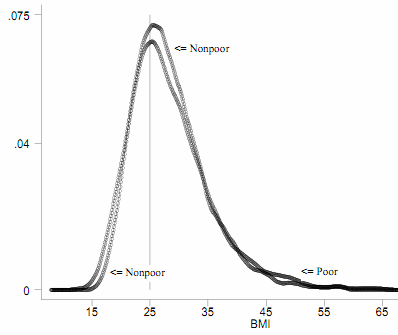In both the popular press and academic research, there is the argument that the growth of fast food and energy-dense food has been an important cause of the overweight epidemic in the U.S. and that this has disproportionately affected poor people. [Some] argue that limited economic resources may shift dietary choices toward a diet that provides maximum calories at the least cost. An implication of this line of research is that the poor cannot afford healthy diets. (more; ungated)
In fact, however, the poor are on average not fatter than the rich:
Contrary to conventional wisdom, … the poor have never had a statistically significant higher prevalence of overweight status at any time in the last 35 years. Despite this empirical evidence, the view that the poor are less healthy in terms of excess accumulation of fat persists.
A new paper manages to find a relation between poverty and fat – both the very fattest and the very thinnest people tend to be poor:
Distribution-sensitive measures of overweight … [show] that the severity of overweight has been higher for the poor than the nonpoor throughout the last 35 years. … The strongest relationship between income and BMI is observed at the tails of the distribution. … For those at the tails of the BMI distribution, increases in income are correlated with healthier BMI values.

OK, but this hardly supports a general story that the poor can’t afford healthy diets. It fits much better with there being a small fraction of “broken” folks who tend both to have low abilities to earn money, and to have an unhealthy weight, both too high and too low.




One does not simply overcome bias.
This is ridiculous. As many commenters have pointed out, there are any number of reasons why poverty might and does cause obesity and a good number of others in which it'd cause the opposite.
When I was a poor student I ate a lot more fast food but when I had little money left till the end of the week I bought discounted, unhealthy but small ready-meals. The former behaviour piled it on whilst the latter was portion control.
Now I spend as much money as I like on food generally (i don't exactly like to invest it wisely) and yes it does include days with too many packs of crisps (potato chips to you) and never a cheeseless fridge but there's also much less of a psychological need for fast food now that I don't feel so out in the cold, less in need of comfort. Plus smoked salmon tastes so good. This is the thing. I once treated a girlfriend to a fancy restaurant and we ate every bite so slowly and with so much pleasure that she said "Now I know why rich women are thin. It's so delicious you almost don't care if there's only a little"
There's certainly a strong overall correlation in Britain but for us it seems obvious why it might not be so clear cut in the US. Your portions are huge. I was stunned at how much KFC a little money could buy you. The whole cheery hospitality thing you have over there is brilliant but nothing says "you're welcome" better than a well piled plate.So if you're well off enough to regularly dine out at the kind of TFI Friday tier, you'd struggle to maintain your weight.
Clearly the question needs to be broken down into smaller parts but poverty does cause obesity and so does being well off.